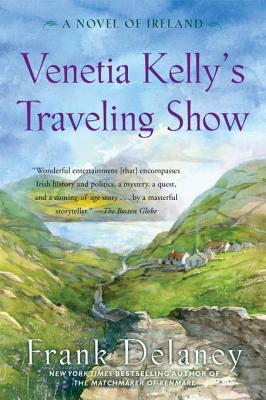 Frank Delaney was well known in the UK before those of us in the United States had heard of him; NPR has called him “the most eloquent man in the world”, and after I had read Ireland, an epic novel that has to do with a storyteller and so much more, I was sold. I wasn’t blogging or reviewing back then, and after I had turned the last page, I told my family that I wanted to read everything else Delaney had written. Then I received this novel as a Christmas present, and was underwhelmed. I set it aside and figured I would give it away, but later I realized that it was the first in a trilogy for which I had also received the other two books. In February of this year, I took a deep breath and plunged in for another try.
Frank Delaney was well known in the UK before those of us in the United States had heard of him; NPR has called him “the most eloquent man in the world”, and after I had read Ireland, an epic novel that has to do with a storyteller and so much more, I was sold. I wasn’t blogging or reviewing back then, and after I had turned the last page, I told my family that I wanted to read everything else Delaney had written. Then I received this novel as a Christmas present, and was underwhelmed. I set it aside and figured I would give it away, but later I realized that it was the first in a trilogy for which I had also received the other two books. In February of this year, I took a deep breath and plunged in for another try.
This novel is much briefer than Ireland, and I’m a reader that often finishes a good book of this length in a weekend. The problem is that this one isn’t that good. In fact, I found myself wondering whether the author had perhaps been about to produce another similarly epic work and instead decided to chisel three books out of it. Whereas Ireland magically blends Irish history, culture, and political struggle with the fictional memoir of a young boy that has met and been captivated by a wandering story teller, creating a story one can sink into and forget the rest of the world even exists, this story, which is also a family’s fictional memoir, feels like a hamster on its wheel, going through the same stuff over..and over…and…
The setting is rural Ireland in 1932; the protagonist is Ben MacCarthy, and he spins the first person narrative that makes up the story. His family is one of humble farmers, and like so many families, they barely eke out a living. The farm has been in Ben’s mother’s family for generations. His father is frustrated, not meant to be a farmer it seems, and maybe that is why he is so easily caught up in the snare set for him by the Kelly family. The Kelly patriarch is Thomas “King” Kelly, a wealthy, connected man, and Venetia is his daughter. She travels as the main act in a caravan, and Ben’s father falls in love with her instantly, leaving Ben and his mother without a means of subsistence.
Almost the entire book is the account of Ben, whose mother sends him to bring his father home, though he is just an adolescent himself, as he goes after his father, is rejected, and then is sent back after him again. It’s monotonous and irritating. Part of the story has to do with Venetia’s ventriloquism and her dummy, Blarney. Clearly Blarney is intended to draw and amuse the reader, but I found another of my eye-rolling frenzies coming on. Right, I want to say. Cute. Now can we cut to the chase?
Delaney at his best doesn’t cut to the chase; that’s the whole point of weaving a story, to make the reader want to hear more detail, not less. In Ireland, he succeeded, and I grieved for a week when the story was over, because I wanted it back. With this story it was more the opposite; I hit the 78% mark after months of reading it in small snippets, basically only resorting to it when my electronic reader had to be charged. I kept it conveniently by my bedside so it would entice me, but just looking at the cover became a chore, and I finally resolved to skip to the end, then figure out how much of it could be skimmed to understand the outcome and give the other two books a try. Had my loving relatives not put full cover price into not only this title but the two that come after it—and oh I do hope they’re better!—I wouldn’t have bothered.
One side character that stands out and prevents this from being a 2 or 2.5 star novel is Billy Maloney, the handyman that swears profusely. Because his mother won’t hear profanity, young Ben repeats Billy’s messages verbatim, and rather than leave out the curses, he substitutes the word “flockin’” in their place. We will forget all about Billy as we get caught up—or not—in the MacCarthy family’s drama and the Kellys’ schemes, and then all of a sudden a whole stream of ‘flocks’ will appear. There were some other devices Delaney also used, but they didn’t work for me. This one did.
Well, what can I tell you? If you are a dedicated fan of Irish literature and you have deep pockets, go ahead. You’ve seen what I have to say, and if you still want the book, you can buy it.
But if you’re only getting one sumptuous, luxurious novel and you love tales of Ireland, then that’s the book I recommend to you. Read Frank Delaney’s Ireland, and let this one stay in its warehouse.
